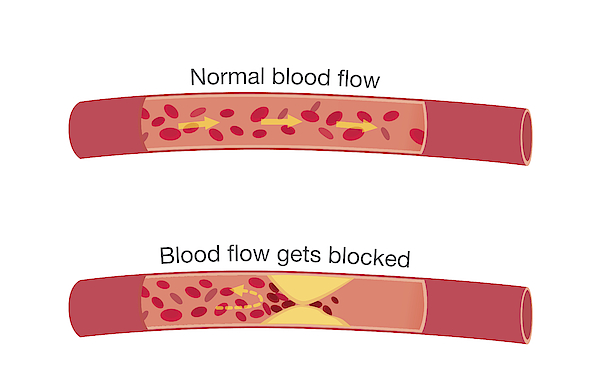High cholesterol means increased lipids (fats) in the blood. The normal level of total cholesterol varies between 150 – 200 mg per 100 ml of blood. There are two kinds of cholesterol, HDL (high-density lipoprotein) which is good cholesterol, and LDL (low-density lipoprotein) which is bad cholesterol. Too much of LDL cholesterol circulating in the blood can contribute to problems such as heart disease, stroke. Several factors can increase cholesterol levels such as heredity, a diet high in saturated fats, metabolic disorder like diabetes, smoking, alcohol, or stress. Fortunately, high blood cholesterol responds well to nutritional supplements and moderate lifestyle changes.
High Blood Cholesterol Symptoms
- High blood cholesterol has no symptoms. A blood test (lipid test) is the only way to detect high cholesterol.
Home Remedies for High Blood Cholesterol
- Garlic: Eat 2-3 flakes of raw garlic daily whenever possible. OR Take 500mg garlic capsule twice daily. Garlic supplementation seems to reduce total and LDL cholesterol. Check with your doctor if taking any anti-thrombotic drugs.
- Apple cider vinegar: Drink one tablespoon of apple cider vinegar mixed in a glass of water. The pectin content and amino acids found in apple cider are effective in neutralizing the bad cholesterol levels in the body.
- Ginger: Take 5 -10gm of ginger capsule in divided doses per day. Ginger lower cholesterol by binding to it and inhibiting its absorption. Also, you can consider drinking ginger tea throughout the day. If pregnant, do not take more than 1 gm of ginger.
- Honey and lime juice: Add one teaspoon of honey and one teaspoon of lime juice in one cup of hot water and drink early morning.
- Coriander: Boil two tablespoons of dry seeds of coriander in a glass of water and strain the decoction after cooling. Take this decoction twice a day. The coriander seeds had a significant hypolipidemic action.
- Honey and cinnamon: Take one tablespoons of honey and half teaspoon of cinnamon powder in one cup of hot water thrice a day.
- Fenugreek: Soak one teaspoon of fenugreek seeds in water overnight. Eat the soaked seeds on an empty stomach next morning. Do this daily for a few months. Fenugreek has antioxidant and cardio-protective benefits. Also, it is excellent for reducing the risk of atherosclerosis.
Do’s for High Blood Cholesterol
- Eat fiber rich foods, whole grains, oats, soy products, and fruits.
- Eat 2-3 flakes of garlic daily.
- Use olive, coconut, or canola oil for cooking. Olive oil raise good cholesterol and lower bad cholesterol circulating in the bloodstream.
- Drink 8-10 glasses of water daily.
- Exercise regularly. Exercise lowers bad cholesterol and increases good cholesterol.
- Lose weight if necessary. Sometime, losing fat cells is all that is required to lower cholesterol.
- Manage stress by practicing deep breathing exercise or meditation.
Don’ts for High Blood Cholesterol
- Avoid high-fat foods and hydrogenated oils.
- Avoid sugary products and alcohol as they stimulate the liver to produce cholesterol.
- Avoid excessive consumption of milk and its products like ghee, butter, and cream; white flour, sugar, cakes, pastries, biscuits, cheese, and icecream; and non-vegetarian foods like meat, fish, and eggs.
- Avoid palm oil for cooking.
See Doctor
- Having a family history of heart disease.
- Having high blood pressure or diabetes.
- Severe chest pain, or discomfort, pressure, squeezing, or heaviness.
- Severe headache.
High Blood Cholesterol FAQ
- What is the relation of high cholesterol with heart disease?
- What should be the normal level of HDL and LDL cholesterol in a blood?
- Does eating food with high fats cause heart disease?
★★ Get our FREE Mobile app, Recommended by 90+ Doctors. Stay Healthy! ★★

why shouldn’t one use coconut oil for cooking? Hasn’t it got the good cholesterol?
It says that it is one oil to use along with olive oil and canola oil.
There are some High Cholesterol symptoms and it does cause deep damage to the body. Over time, too much cholestrol may lead to buildup of plague inside the arteries. Known as atherosclerosis, this condition narrows the space available for blood flow and can trigger heart disease.